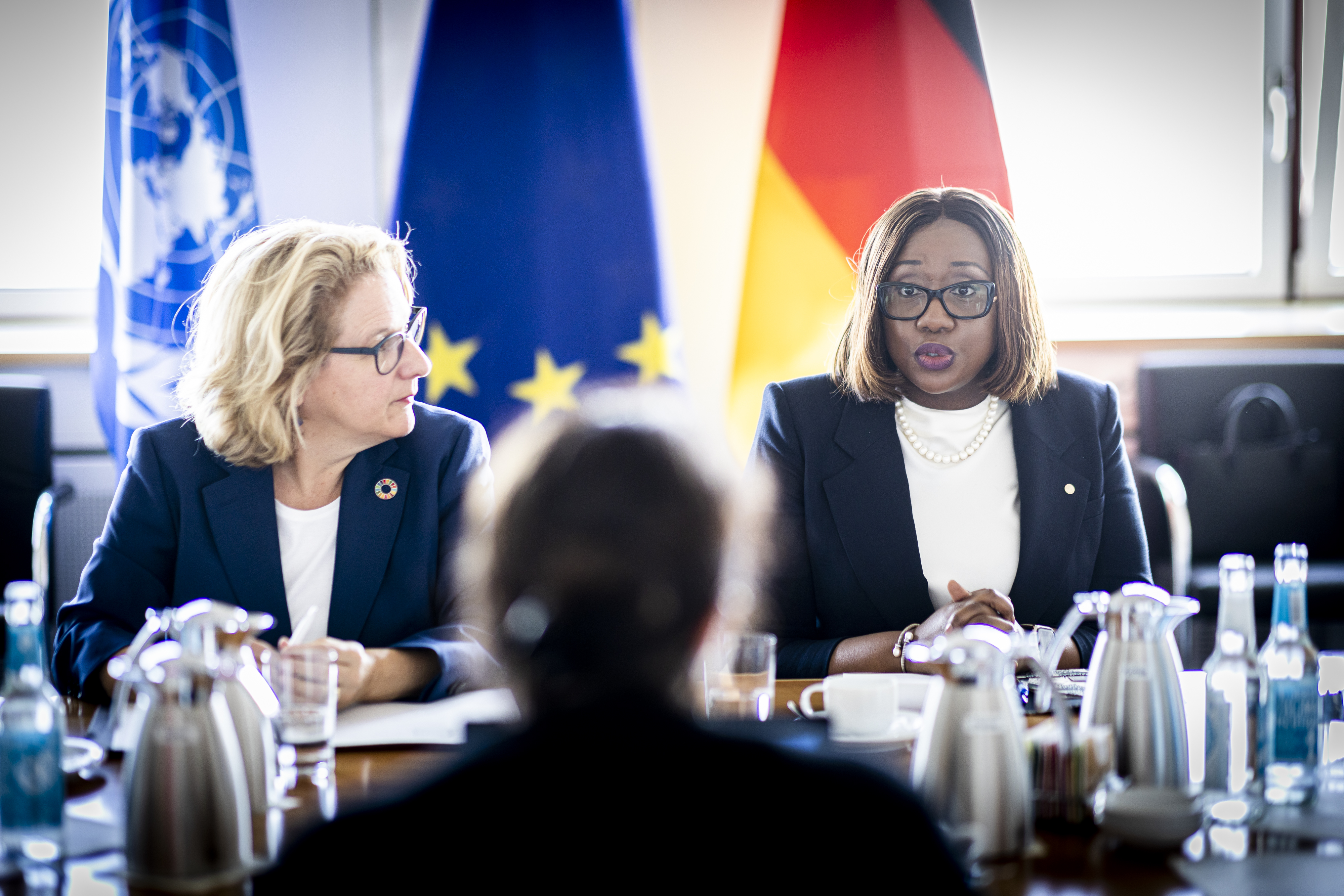Government negotiations Regional solutions for West Africa's challenges / Germany pledges further support for ECOWAS
German Development Minister Svenja Schulze with Damtien Tchintchibidja, Vice President of the Economic Community of West African States (ECOWAS)
Development Minister Svenja Schulze said, “Solutions to West Africa’s crises need to come from within the region itself. ECOWAS plays a key role in that. Not only does it step in as a mediator in crisis situations but it also works hard to prevent crises occurring. My role as Development Minister is to lend every possible support to the region’s own initiatives for promoting peace and economic development. One key objective is to tackle the underlying causes of the conflicts in the region. That means focusing on economic development that creates jobs for young people, building up social protection systems, and ensuring local authorities are visibly engaged in meeting people's needs.”
It was agreed to focus cooperation over the next few years on the following main areas:
Peacebuilding and crisis prevention: Since 2020, four ECOWAS member countries have seen their governments overthrown in coups: Mali, Guinea, Burkina Faso and, most recently, Niger. The crisis in the Sahel is now also starting to impact the countries to the south in the Gulf of Guinea. There is a serious danger of extremist violence seeping into those countries. The BMZ’s support aims to help ECOWAS increase its work in civilian sectors, which looks to the long term. One example is the expansion of the Fund for Regional Stabilisation and Development in Fragile Regions within ECOWAS. The fund plays a vital role in preventing and managing crises, for example by creating new jobs. Experience has, after all, shown that extremists are less able to recruit followers if young people in particular feel they have alternatives and opportunities. The BMZ also advises the ECOWAS Commission on the prevention of violent conflicts, for example by strengthening the civilian capacities of the ECOWAS standby force and by strengthening early warning systems.
Renewable energies and energy efficiency: West Africa's inadequate and unreliable energy supply is a major obstacle to development. Only around 42 per cent of the region’s 400 million or so people have access to electricity. The BMZ is therefore supporting ECOWAS in developing the West African electricity market and power pool. This also includes expanding renewable energies.
Trade, infrastructure and sustainable supply chains: Thanks to the efforts of ECOWAS, which currently comprises 15 member states, the West African economic area has made progress in many areas – improving trade within a common free trade zone, building transboundary roads and expanding communication networks. The decision taken by ECOWAS back in 1979 to allow freedom of movement between its member states is seen as a model for other regions. It was determined that citizens of ECOWAS countries would be able to travel within the region without a passport, could remain for up to 90 days visa-free in all member states and could choose their place of residence freely. All of these are vital steps towards boosting trade between countries, encouraging private investment and creating jobs for the rapidly growing younger generation. The BMZ supports ECOWAS in its self-declared goals of further improving conditions for regional and continental trade within the ECOWAS region and successfully integrating the association into the Africa-wide African Continental Free Trade Area (AfCTA), which the African Union is currently working hard to expand. This means focusing on agricultural trade and on regional value added in West Africa. Value can be added by processing agricultural produce locally, with a focus on small and medium-sized enterprises and also female-run businesses. Often these are the backbone of the local economy.
Health, pandemics and One Health: The COVID-19 pandemic showed how quickly diseases can spread across borders. The BMZ is therefore supporting ECOWAS in its efforts to prevent pandemics in order to better protect the population from diseases in future. Specifically, ECOWAS institutions and specialist agencies plan to set up a surveillance system for preventing and controlling pandemics.
Communication: The BMZ will also provide ECOWAS with greater support in strengthening its communication and data protection capacities. The aim is to improve the organisation’s visibility as a driver for economic and political integration in the region, to strengthen it as a mediator that can help facilitate democratic and constitutional handovers of power and to boost its capacity to combat media disinformation.
ECOWAS
The Economic Community of West African States (ECOWAS) was founded in 1975 with the aim of promoting economic cooperation in West Africa. It is Africa’s oldest and most active regional organisation. Its mandate has grown to include civilian-military peace missions and crisis prevention. The 15 member states are Benin, Burkina Faso, Cape Verde, Côte d'Ivoire, Gambia, Ghana, Guinea, Guinea-Bissau, Liberia, Mali, Niger, Nigeria, Senegal, Sierra Leone and Togo. Due to the recent coups in Mali, Niger, Burkina Faso and Guinea, membership of those countries is, however, currently suspended.
